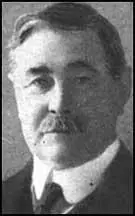Thomas Power O'Connor

Thomas Power O'Connor was born in Athlone in 1848. After an education at Queen's College, Galway, and became a journalist for the Saunders' Newsletter in Dublin before moving to London to work for the Daily Telegraph.
O'Connor held radical political opinions and in 1880 General Election became the Irish Nationalist MP for Galway. He continued to work as a journalist and in 1887 founded and edited the radical newspaper, The Star.
Henry Hamilton Fyfe, the future editor of the Daily Mail and the Daily Mirror, claimed that with O'Connor's was the founder of what became known as the New Journalism. One important innovation introduced by The Star was the regular political cartoon. O'Connor also founded the T.P.'s Weekly (1902).
O'Connor wrote several books including a critical biography of Benjamin Disraeli, Lord Beaconsfield (1879), The Parnell Movement (1886) and Memoirs of an Old Parliamentarian (1928). O'Connor also returned to the Daily Telegraph, where he became the main contributors to its famed obituaries section.
Thomas Power O'Connor died in 1929.
Primary Sources
(1) Thomas Power O'Connor, Memoirs of an Old Parliamentarian (1928)
I made an excellent choice of an assistant editor of The star in the late Mr. H. W. Massingham, who was then in the obscurity of a syndicate agency of small importance; and for the first time his brilliant pen got a real scope. He used to talk with rapture of a gentleman whose name neither I nor, indeed, anybody else had ever heard before; his name was George Bernard Shaw; he was appointed as one of the assistant leader-writers.
I was recommended by Sir John Robinson, of the Daily News, to a young man named Ernest Parke, then working in the office of a City newspaper. Ernest Parke was then a young, flossy-haired man, with a keen face, a lithe and agile body, a tremendous flair for news, and capable of twenty-four hours' work, if necessary, in a single day. He was, as he is, a singular mixture of shrewdness and ideals; and intense Radical, and at the same time a thoroughly practical journalist. He might be trusted to work up any sensational news of the day, and helped, with Jack the Ripper, to make gigantic circulations hitherto unparalleled in evening journalism.
(2) Henry Hamilton Fyfe was a reporter on The Times when he read the first edition of The Star.
I recollect very well reading the first number of T. P. O'Connor's Star (that was in 1888). I read it over my cocoa and aerated bread lunch - with excited enjoyment. T. P. O'Connor, a journalist of genius, really was the founder of the New Journalism which ousted those dull morning papers ten years afterwards. His Star offered good reading from many pens, some already famous, some to be. He was bold enough also to declare a policy of justice for the under dogs. "The rich, the privileged, the prosperous," he wrote, "need no guardian or advocate; the poor, the weak, the beaten require the work and word of every humane man and woman to stand between them and the world."
(3) Edward Lawson-Levy, The Story of the Daily Telegraph (1955)
T. P. O'Connor was one of the greatest journalists of all time. In his old age T. P. came back to the Daily Telegraph as a contributor particularly in the somewhat specialized field of anticipating the news requirement of the last enemy. Much of his work of this time, particularly when he wrote of men he knew well, was brilliant and T. P. obituaries were a great attraction of the Daily Telegraph.
